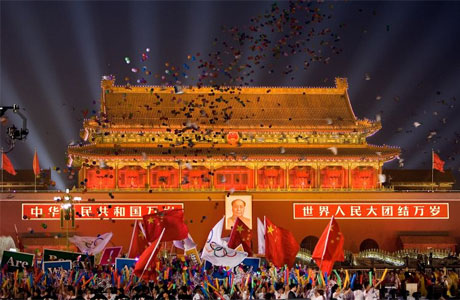Will We Be Able to Watch the Olympics this August?
 For over seven years, the world has been waiting for the start of one the most highly-anticipated Olympics ever, and the drama leading up to this August's event has definitely lived up to the hype.
For over seven years, the world has been waiting for the start of one the most highly-anticipated Olympics ever, and the drama leading up to this August's event has definitely lived up to the hype.
We've seen everything from massive pro-China and pro-Tibet rallies across the globe to Olympic terrorist threats, to the most powerful earthquake in the 50-year history of the People's Republic of China. While Olympic organizers and the people of Sichuan Province might have preferred a less-eventful set-up to the Olympics, it's whet the appetites for billions.
But there's a chance that the masses watching the Games from the comfort of their television sets might not get a complete picture of the events. According to notes from a May 29 Olympic meeting obtained exclusively from Stephen Wade of the Associated Press, there's new friction between Olympic offiicals and broadcasters.
Avid sports fans will be able to see every detail or every sporting event, from synchronized swimming to speedwalking. On the other hand, people expecting to see sweeping aerial footage of the Forbidden City, or hear their favorite news personality live in Tiananmen Square will be disappointed.
While only nine broadcasters who have the exclusive Olympic broadcasting rights met with high-level officials at this "emergency meeting," this meeting exemplifies the historic tension between Beijing's historically tight-grip on media coverage and its January '07 promise to give foreign media "unrestrictive access" to China.
On the one hand, the Olympics are the perfect platform for China to showcase its vibrant culture and booming economy. On the other hand the increased spotlight on China also can bring some of the less flattering aspects of Chinese society to the surface.
The interesting irony remains the fact when China strengthens its media grip on foreign journalists, the coverage tends to be less favorable. Conversely, if China takes a more laissez-faire approach, the coverage tends to improve.
The earthquake coverage is a prime example of this dynamic. Many foreign journalists praised the Chinese government's relief efforts and wrote flattering articles of earthquake recovery when they initially had virtually unlimited earthquake relief access. On the other hand, as the LA Times reports, China's propaganda ministry and the State Council are restricting domestic coverage of sensitive earthquake topics, like the safety of school building construction.
Granted, media coverage of any major disaster tends to sour as details unfold, and people realize that some damage from the natural disasters could have been prevented by humans. On the other hand, government conspiracies, repression, and cover-ups can sometimes be even more salacious than the actual events.
China has a pretty difficult tightrope to walk this August. Naturally, impromptu protests against China don't showcase the most attractive side of the Chinese government, but for a foreign audience, any appearance of media censorship will actually look worse than whatever unsightly blemish it might be trying to cover-up.
All things considered, with the multiple promises of a free media during the Olympic, and an estimated 30,000 foreign journalists covering every event from every angle, even with a few bumps in the world, we're bound to see an most comprehensive, mutli-dimensional view of China and this dynamic Olympics.